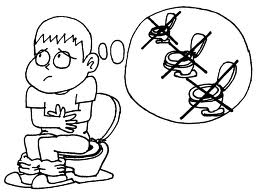Chronic constipation isn’t just uncomfortable—it’s can be a serious health condition. If you are suffering from this condition and haven’t been able to pinpoint the medical cause yet, I recommend setting up an appointment with your doctor to get tested for celiac disease or a food insensitivity, in particular to gluten. Commonly experienced by celiacs, chronic constipation has also been linked to hypersensitivies to gluten as well as to other foods.
First, an understanding of how does celiac disease and gluten sensitivity cause constipation is essential. Celiac disease is an autoimmune reaction to gluten, a protein found in wheat, barley, and rye. The disease works by attacking the villi, the finger-like structures that line the small intestine, inhibiting proper absorption of nutrients. The results? After your colon is backed up, so will the small intestine back up, leading to a delay in gastric emptying in your stomach, resulting in reflux and heartburn, reducing nutrient absorption, and keeping toxins inside the body, causing stress on the immune system.
The most important thing for you to focus on if you have celiac disease is to totally eliminate gluten from your diet, but there are other natural ways to ease constipation as well. After all, after cutting out gluten, it will take a while before your body achieves a complete recovery, if ever. It’s been recommended to drink a lot of water throughout the day, including some warm water with a natural fiber supplement as well as a supplement containing slippery elm bark, flax seed, and L-Glutamine, the last of which is often just called glutamine. A probiotics supplement may also be taken, then a flax oil supplement later in the day. Finally, its recommended to get plenty of exercise, every day if possible. These methods in conjunction with eliminating gluten and increasing the intake of high-fiber foods should lead to constipation relief in a week to two weeks. Always consult a medical professional before making changes to your diet, of course.
Not only is chronic constipation linked with gluten intolerance and celiac disease, but it may be a symptom of other food sensitivities or allergies. Studies are indicating that chronic constipation may be linked to a hypersensitivity to cow’s milk protein called casein, in particular among children. I would recommend a similar method of fighting constipation in cases of hypersensitivity to other foods and getting tested by a medical professional for hypersensitivities so you can successfully eliminate the constipating food source.
In my work as a writer, researcher, and gluten-free health advocate (glutenfreehelp.info), I see the damaging and even life-threatening effects of celiac disease and food allergies every day, especially chronic constipation. If you’re fortunate enough to have already been diagnosed with celiac disease or a hypersensitivity to gluten, but you’re still experiencing symptoms of constipation, get proactive about handling your condition right away. Likewise, if you’ve been experiencing this condition for quite some time and don’t yet have an answer, it’s worthwhile to look into a food sensitivity as soon as possible, and always seek proper medical advice from someone you can trust.
Tina Turbin
Resource:
Medscape Today: Chronic Constipation and Food Hypersensitivity – An Intriguing Relationship
From our home to yours, Tina Turbin
If you have any questions or suggestions just email me at Info (at) TinaTurbin (dot) com.









Aw what a cute cartoon picture this! It’s not every day that you can find a picture for constipation that you would describe as “cute”!
You are so right that constipating is something that needs to be taken seriously! Some people will go for years with almost-daily constipation and not think that it’s necessary to handle. Wrong! Even after the gluten free diet, I still had constipation, but then I dramatically changed my diet to include fruits and veggies so that way I could get more than enough fiber.
I’m glad you have said something about this. My constipation was really really awful before I switched to a gluten free diet and I didn’t even realize it at the time how bad it was until it was finally gone! Not only did I get really bad headaches as a result, but I was just so uncomfortable and had trouble relaxing and sleeping and sitting down to concentrate on my work!
I have been gluten free since a food sensitivities test in 2009. I do not have celiac disease but I do have many food sensitivities. I was recently retested for food sensitivities and it was found that I have many more than I had in 2009. I have suffered from constipation all my life and except for a period of 2 years when I had diarrhea (probably from the probiotic I was taking along with L Glutamine). I now have been diagnosed with candida and leaky gut syndrome and my constipation is worse than ever. Now I find that L Glutamine is making me constipated (I’ve been taking it to heal leaky gut). I tried aloe vera gel and it constipates me too. I’d really like to get this figured out. Any ideas?
This article did nothing to explain how celiac disease causes constipation. Celiac disease affects the small intestine, how does then cause constipation. Saying that once your colon is backed up this will lead to small intestine backing does nothing to explain what causes the constipation in the first place.
Worthless….
Can Constipation Be a Symptom of Gluten Intolerance?
You dumb asses need to realize that celiac disease and gluten intolerance are NOT the same thing. Though all persons with celiac disease are gluten intolerant, MOST persons suffering from gluten intolerance DO NOT have celiac disease. But in this day and age on the internet where people just LOVE to wear their disease like a badge of honor, I say go for it. If you want to tell the world you are suffering from celiac disease, I say go for it! LOL!
I’ve had idiopathic constipation for 4 years and I’m beginning to think its gluten intollerance. I’ve been to the doctors many times but the only thing thats happened is I’ve been prodded a bit and given laxatives. I’ve actually been told that intollerances don’t cause constipation before now, but sources like this (although not scientific peer reviewed journals) say otherwise. I’m just honestly getting a bit fed up with it now : I’m only 21, do they want me on laxatives for the rest of my life?
My doctor says the exact same thing to me! Did you find out already?